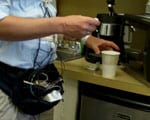Study finds e-readers have opposite effect on middle school girls who struggle with reading
Middle school boys rated reading more valuable as an activity after two months of using an e-reader, according to a new study.
The findings come from a study of 199 middle school students who struggle with reading and who participated in a reading improvement class that included Amazon’s Kindle e-reader, said one of the study’s authors, Dara Williams-Rossi, Southern Methodist University, Dallas.
The researchers found that boys consistently had a higher self-concept of their reading skill than girls both before and after using the e-readers. After use of the e-readers, boys’ attitudes about the value of reading improved, while girls’ attitudes declined, said Williams-Rossi, an assistant clinical professor in the Annette Caldwell Simmons School of Education and Human Development at SMU.
Technology motivated boys; girls appear to prefer actual books
“The technology appeared to motivate the boys to read, while many girls preferred the actual books,” said Williams-Rossi, who is also director of undergraduate programs in Simmons. “The data showing the girls’ preference were statistically significant and particularly intriguing. This is part of a 3-year study and this data came midway through, so we are continuing our investigation and interviewing girls to understand their reaction to the e-readers. It may be that they prefer curling up with actual books and that they enjoy sharing their reading with their friends.”
Among the findings, students generally liked using e-readers and many felt that using it helped their reading improve. Sixth- and seventh-graders were more enthusiastic than eighth-graders about the e-readers, the researchers found.
Based on anecdotal comments from the children, the researchers found the e-readers sparked excitement among the students, resulting in positive attention for the students in the reading improvement classes. Over the course of the study, word about the e-readers spread around the school, and students who weren’t in reading improvement classes began asking how they could join “the Kindle classes.”
Access to Internet a challenge; boosts need for teacher monitoring
For the study, the researchers provided e-books on the Kindle e-readers to 199 students at an urban middle school in Fort Worth, Texas. The students had about 15 to 25 minutes during their silent reading improvement class period to read high-interest chapter books and stories on the Kindle. Books included 25 classics, including The Wizard of Oz and Black Beauty, as well as ghost stories and scary stories, which were the most popular. Students said they read between one and four e-books over the course of the two-month study.
Teachers generally thought the e-readers were better at getting their reluctant readers engaged, but they reported being frustrated by students’ easy Internet access through the district’s Wi-Fi, which required them to monitor the students more closely. Also, the teachers had to spend time keeping the e-readers charged, checked-out and locked up each night, but teachers told the researchers they plan to incorporate e-readers into their classes in coming years.
Overall, the students and their two teachers rated the experience as highly satisfying. In asking individual students what they liked about the e-readers, they said they liked not having to carry a lot of books; they liked other students not knowing their reading level or choice of book; they liked that the book they were reading was always available and hadn’t been removed from the classroom. The voice-to-text feature was popular with students for whom English is a second language.
In describing their reactions to the e-readers, students advised improvements to the Kindle and the books: a light, so it can be read in the dark; pictures; more books; and graphic novels.
Middle schoolers read less than younger students; “boring way to spend time”
Study findings were published in the International Journal of Applied Science and Technology as “Reluctant Readers in Middle School: Successful Engagement with Text Using the E-Reader,” authored by Williams-Rossi with three other researchers from Fort Worth, Texas: Twyla Miranda, Texas Wesleyan University; Kary A. Johnson, The Reading Connection; and Nancy McKenzie, Tarrant Community College.
“It’s inevitable that e-reader technology will enter school classrooms,” said the study’s authors. “Our study presents reasons e-readers may be beneficial, in particular, to reluctant readers in middle grades.”
Previous research in the field has shown that upper elementary and middle school students tend to read less than younger students because of time spent with their friends and in other activities. Also, these same students, particularly boys, may not value reading as much as they did when they were younger. One study found that most students indicated reading is a “boring way to spend time.”
Among those students, research has shown that low-skilled readers have trouble starting, continuing and finishing a book, and that they are stymied by vocabulary and reading comprehension challenges. Skilled readers, on the other hand, enjoy books.
Researchers have suggested that technological gadgets, enlarged text and a more favorable environment might encourage reluctant readers. For those reasons the authors pursued a study to see how reluctant readers would respond to e-readers. Rotary International purchased the e-readers for the research.
The findings also will be published in “E-Readers: The Next Big Thing for Reluctant Middle School Readers,” in Educational Leadership, which Williams-Rossi authored with Miranda and Johnson; and “Using E-Readers to Engage Middle School Students” in the “Proceeding of the 35th Annual Reading Association of Ireland Conference,” which Williams-Rossi authored with Miranda, Johnson and McKenzie. — Margaret Allen
SMU is a nationally ranked private university in Dallas founded 100 years ago. Today, SMU enrolls nearly 11,000 students who benefit from the academic opportunities and international reach of seven degree-granting schools. For more information see www.smu.edu.
SMU has an uplink facility located on campus for live TV, radio, or online interviews. To speak with an SMU expert or book an SMU guest in the studio, call SMU News & Communications at 214-768-7650.


 College students willing to donate genetic material to biobanks for research
College students willing to donate genetic material to biobanks for research Study: Nearly two-thirds of EU citizens are marginalized by English-language dominance
Study: Nearly two-thirds of EU citizens are marginalized by English-language dominance From ‘Green Card’ to ‘Thin Blue Line’: Lawtalk research looks at popular legal expressions
From ‘Green Card’ to ‘Thin Blue Line’: Lawtalk research looks at popular legal expressions Public health insurance provides insured infants better, less costly care than private plans
Public health insurance provides insured infants better, less costly care than private plans Indian, Vietnamese immigrants become American over time through civic activities, say anthropologists
Indian, Vietnamese immigrants become American over time through civic activities, say anthropologists CERN scientists find hints of Higgs boson — “God” particle
CERN scientists find hints of Higgs boson — “God” particle








